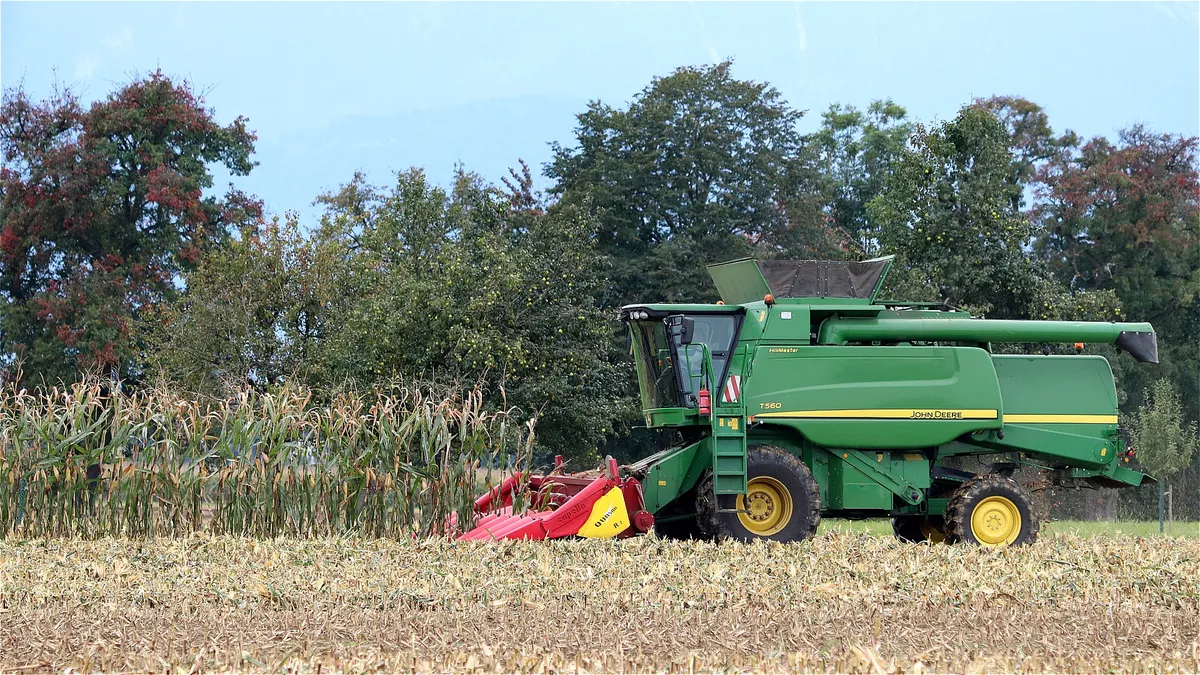UPDATE: Dec. 10, 2019: John Deere will lay off an additional 57 employees at its Davenport, Iowa, facility, Director of Global Public Relations Ken Golden confirmed to Supply Chain Dive, bringing the total to roughly 170 at that facility. The 57 newly-affected employees were notified Dec. 2, and will be laid off effective Jan. 6, 2020. "This action is taken in response to current market conditions. Each Deere factory must balance the size of its production workforce with customer demand for products from their individual factory," said Golden via email.
Dive Brief:
- John Deere will lay off a total of 163 workers at two plants, one in Davenport, Iowa, where the company manufactures forestry equipment, and one in East Moline, Illinois, where it produces agricultural machinery. The plants will remain open and operational.
- John Deere Director of Global Public Relations Ken Golden told Supply Chain Dive the layoffs, effective Oct. 28, are due to decreased customer demand. "Each Deere factory balances the size of its production workforce with customer demand for products from their individual factory," Golden said.
- Deere executives have described their concerns about diminished demand on multiple earnings calls, with an emphasis on agricultural equipment. Golden said the company is confident in its long-term strategy despite lowering sales and net income forecast for the 2019 fiscal year.
Dive Insight:
"We are now beginning more aggressive action on our cost structure to create a more efficient and nimble organization," said CFO Ryan Campbell, in August, adding a "footprint assessment" was in the cards for the OEM. Golden confirmed only the Iowa and Illinois facilities are affected so far.
In February, Investor Communications Manager Brent Norwood called farmer sentiment "fluid" as the company predicted flat growth for this year. By May, the company announced it would need to reduce production by as much as 20%, but in August, Investor Relations Director Josh Jepson said that figure may have been misleading. He clarified John Deere would underproduce large tractors from a year ago and also operate more "efficiently and effectively" across categories.
John Deere equipment in most cases represents a significant investment. Replacing old farm equipment with shiny new green machines most likely occurs when times are good for corn, soy and wheat farms that need John Deere's largest products. Since the trade war with China has virtually closed U.S. farmers' largest export market, these could not easily be called good times.
On the company's August earnings, Norwood said the uncertainty in the U.S. agricultural industry had only increased throughout the year, adding other producers like Brazil have shown strength at the same time. Worldwide net sales for John Deere were down 3% in the quarter ending in August — down 6% year-over-year in the agricultural segment of the business alone.
Campbell said in August that moving forward, the company will work to position itself to "capitalize upon the resumption of replacement demand growth."














